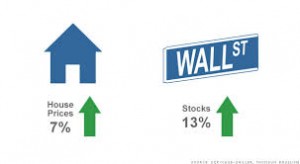By Stephen Tweed, CSP
An article in the August 13th edition of the Wall Street Journal put words to a concept I have been following for several years and have seen it’s impact on the private duty home care business. It’s called “The Wealth Effect” and it has to do with how the level of consumer confidence affects spending.
In the article, it says:
“Shoppers are “seeing the value of their homes and retirement accounts go up,” said John Venhuizen, chief executive of Ace Hardware Corp., an Oak Brook, Ill., retailer cooperative with 4,700 stores globally. “That wealth effect is making people feel more comfortable buying higher-priced items like barbecue grills, which increased by double digits in July” from a year earlier, he said.
Consumers started the year confronted by higher taxes, surging gasoline prices and the impact of federal budget cuts. However, more than halfway through 2013, they are notching the highest confidence levels in years. Economists attribute the optimism to a gradually improving jobs picture, rising home values and the bull market in stocks.”
 There are many factors that can affect “The Wealth Effect” but the three mentioned in the article certainly apply to home care, jobs, rising home values, and growth in the stock market. I’ve been talking for several years in my seminars and workshops about how I’ve seen the volatility in the stock market affecting how much high net worth individuals are willing to spend on home care services. When their stock portfolio is up, they’ll write checks for home care even if they are not tapping into their investments to pay the home care bill.
There are many factors that can affect “The Wealth Effect” but the three mentioned in the article certainly apply to home care, jobs, rising home values, and growth in the stock market. I’ve been talking for several years in my seminars and workshops about how I’ve seen the volatility in the stock market affecting how much high net worth individuals are willing to spend on home care services. When their stock portfolio is up, they’ll write checks for home care even if they are not tapping into their investments to pay the home care bill.
As owners and leaders in home care, you need to be paying attention to the factors like jobs, home values, the stock market, the price of gold, and the level of retail sales. These are all factors that can help you understand the level of The Wealth Effect in your town.



